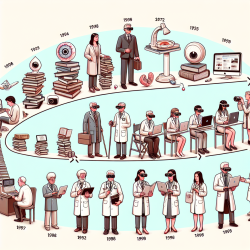The landscape of gender-affirming care is evolving rapidly, with increasing attention on the self-administration of hormones as a viable option for transgender and gender-diverse individuals. A recent systematic review titled "Self-administration of gender-affirming hormones: a systematic review of effectiveness, cost, and values and preferences of end-users and health workers" sheds light on this critical area. This blog explores how practitioners can leverage these insights to enhance their skills and provide better care.
The Context and Importance
Globally, an estimated 25 million transgender people face significant barriers in accessing healthcare that aligns with their gender identity. Gender-affirming hormone therapy is a crucial intervention for many, yet access remains limited due to various systemic challenges. Self-administration offers a potential solution by empowering individuals to manage their hormone therapy independently, provided it occurs within a supportive health system.
Key Findings from the Systematic Review
The review conducted by C. E. Kennedy et al. highlights several important aspects:
- Lack of Effectiveness Studies: The review found no studies meeting the criteria for assessing the effectiveness of self-administered versus health worker-administered hormones.
- User Preferences: Many individuals opt for self-administration due to difficulties finding knowledgeable, non-stigmatizing health workers, lack of access to services, cost concerns, and a desire for faster transitions.
- Health Worker Perspectives: Health workers' views are influenced by restrictive legislation, inadequate transgender-specific services, communication gaps, and medical knowledge deficiencies.
Implications for Practitioners
For practitioners working with transgender and gender-diverse populations, these findings underscore the need for improved training and resources to support self-administration safely. Here are some actionable steps practitioners can take:
- Enhance Knowledge: Stay informed about the latest research and guidelines on gender-affirming care through continuous professional development opportunities such as webinars and conferences.
- Create Supportive Environments: Work towards building inclusive healthcare settings that respect gender diversity and reduce stigma.
- Advocate for Policy Changes: Engage in advocacy efforts to influence policy changes that facilitate better access to gender-affirming care.
- Collaborate with Peers: Network with other healthcare providers to share best practices and strategies for supporting self-administration effectively.
The Role of Further Research
The review highlights a significant gap in literature regarding the effectiveness and cost-effectiveness of self-administered hormone therapy. Practitioners are encouraged to participate in or support further research endeavors that aim to fill these gaps. By contributing to a more robust evidence base, healthcare providers can help develop comprehensive guidelines that ensure safe and effective self-care practices.
Conclusion
The systematic review by Kennedy et al. provides valuable insights into the current state of self-administered gender-affirming hormone therapy. While challenges remain, there are clear opportunities for practitioners to enhance their skills and advocate for better systems that support transgender health. By prioritizing education, advocacy, and collaboration, healthcare providers can play a pivotal role in expanding access to quality gender-affirming care.
To read the original research paper, please follow this link: Self-administration of gender-affirming hormones: a systematic review of effectiveness, cost, and values and preferences of end-users and health workers.










